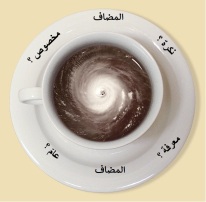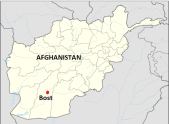 Thresholds are sites of ambiguity, and even danger. It is said that in the past, people believed that evil spirits could lurk by the entrance to a home, and that therefore a man would carry his newly-wedded wife across the threshold in order to prevent her from being harmed by the demons of the threshold. This post is not about superstitions, but rather about a storm-in-a-teapot grammatical point. I draw on the concept of threshold to mediate in the debate over whether the mudaf (in Arabic syntax) is definite or indefinite.
Thresholds are sites of ambiguity, and even danger. It is said that in the past, people believed that evil spirits could lurk by the entrance to a home, and that therefore a man would carry his newly-wedded wife across the threshold in order to prevent her from being harmed by the demons of the threshold. This post is not about superstitions, but rather about a storm-in-a-teapot grammatical point. I draw on the concept of threshold to mediate in the debate over whether the mudaf (in Arabic syntax) is definite or indefinite.
The idafa – a grammatical structure that comprises an apposition of two nouns – is used in Arabic (and some other Semitic languages) to convey a relationship (often, but not necessarily, possession) between the two nouns. For example:
-
|
كتاب زيدٍ kitabu-Zayd(in)
|
“the book of Zayd” / “Zayd’s book.”
|
Note that there are no prepositions or enclitics involved in the idafa structure; the relationship (of possession, etc) is conveyed merely by the apposition of the two nouns, along with the second noun being invariably in the genitive case (which is often indicated by the -in declensional suffix). There is no disagreement over the meaning (and English translation) of the “Zayd’s book” example I just cited. Everyone agrees that in cases like this, where the second term of the apposition (mudaf ilayhi) is definite, the first term (the mudaf) is also definite by mere virtue of its relationship to the former. (Actually, that’s a simplification – be wary when anyone says ‘always,’ ‘never’ or ‘everyone agrees’ in grammar – but I’ll let it slide for now.)
The controversy arises over the mudaf‘s definiteness when the second term (mudaf ilayhi) of the apposition is indefinite, e.g.
-
|
كتاب رجلٍ kitabu-rajul(in)
|
- Is it
-
“the book of a man” ?
-
Or, “a book of a man” ?
|
Of course, one could sidestep the debate by simply translating the term as, “a man’s book,” but grammar enthusiasts will be interested in resolving the issue: is the mudaf in this case considered definite or indefinite? The issue has been much discussed (with some people expressing their opinion on the matter very forcefully), on online forums such as here and here.
Arguments for Indefiniteness (The Classical Grammarians’ Position)
Classical Arab grammarians (as far back as the legendary Sibawayh, d. 180H / 796 CE) have declared that the definiteness status of the mudaf depends on the mudaf ilayhi. In other words, if the second term is definite, then the first term is also definite, and if the second term is indefinite then the first term is indefinite.
قال سيبويه في الكتاب: المضاف إنما يكون معرفة ونكرة بالمضاف إليه
So, according to this, we should translate as follows:
-
|
كتاب رجلٍ kitabu-rajul(in)
|
“a book of a man”
|
According to the classical grammarians in general, then, if the mudaf ilayhi is indefinite then the mudaf is not considered definite, but it is considered qualified (specified, مخصوص).
The following arguments can be cited in support of this position
-
The default state of nouns is considered to be the indefinite (نكرة) state, and therefore in cases of ambiguity about the level of definiteness, one would tend to leave a word with the default (‘indefinite’) classification.
-
An adjective for such a mudaf is typically indefinite, e.g.
لِسَانَ صِدْقٍ عَلِيًّا = “A high reputation (literally: tongue) of honor” (Quran, 19:50)
-
Since an idafa with a definite mudaf is clearly ‘more definite’ (أعرَف) than one with an indefinite mudaf, perhaps putting these on either side of the threshold served as a convenient way to indicate this.
Far be it from me – a mere dabbler in Arabic grammar – to question or critique a master grammarian like Sibawayh. What I will do, however, is to explain the setting of the issue in order to show that the act of definition (here, and often) contains a subjective (and hence arbitrary) element; something that the classical grammarians themselves were often aware of. Having established this ambiguity, I feel there is no harm in leveraging it to help address the Arabic-English translator’s quandary of whether to translate كتاب رجلٍ as ‘a book of a man’ or ‘the book of a man.’
For starters, we can mention that the classical grammarians did make an exception to the rule that a mudaf’s definiteness or indefiniteness matches that of the mudaf ilayh. If the mudaf is a word that is a word of vagueness (متوغِّل في الإبهام , literally: ‘deeply (immersed) in its vagueness’), then the mudaf remains indefinite even if the mudaf ilayhi is definite; it does not acquire definiteness, nor even specificity (تخصيص).
The most common words in this ‘vague’ category are:
|
غير
|
حسب
|
مثل
|
|
other than
|
in accordance with
|
similar to
|
Thus, for example: غير زيدٍ = “other than Zayd”, and the word غير here is considered indefinite, even though its mudaf ilayhi is definite.
…. to be continued
PICTURE CREDIT: “Storm in Teacup” : Modified form of original image by NagualDesign taken from: https://commons.wikimedia.org/wiki/File:Storm_in_a_teacup.jpghttps://commons.wikimedia.org/wiki/File:Storm_in_a_teacup.jpg

 `Ali ibn Muhammad al-Bosti (d. 1010 CE / 401H) belletrist and leading poet and prose-writer of his time. He hailed from the central Asian city of Bost, (known today as Lashkargah, in south-western Afghanistan). Bosti’s language was ornate, displaying skillful use of rhetorical embellishment techniques, especially paranomasia of which he was considered a master.
`Ali ibn Muhammad al-Bosti (d. 1010 CE / 401H) belletrist and leading poet and prose-writer of his time. He hailed from the central Asian city of Bost, (known today as Lashkargah, in south-western Afghanistan). Bosti’s language was ornate, displaying skillful use of rhetorical embellishment techniques, especially paranomasia of which he was considered a master.  He is renowned for his wisdom poetry and aphorisms, particularly the Epitome of Wisdom (
He is renowned for his wisdom poetry and aphorisms, particularly the Epitome of Wisdom ( Thresholds are sites of ambiguity, and even danger. It is said that in the past, people believed that evil spirits could lurk by the entrance to a home, and that therefore a man would carry his newly-wedded wife across the threshold in order to prevent her from being harmed by the demons of the threshold. This post is not about superstitions, but rather about a storm-in-a-teapot grammatical point. I draw on the concept of threshold to mediate in the debate over whether the mudaf (in Arabic syntax) is definite or indefinite.
Thresholds are sites of ambiguity, and even danger. It is said that in the past, people believed that evil spirits could lurk by the entrance to a home, and that therefore a man would carry his newly-wedded wife across the threshold in order to prevent her from being harmed by the demons of the threshold. This post is not about superstitions, but rather about a storm-in-a-teapot grammatical point. I draw on the concept of threshold to mediate in the debate over whether the mudaf (in Arabic syntax) is definite or indefinite.